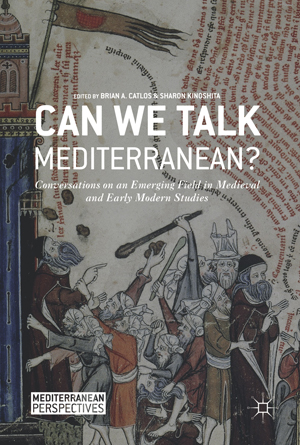Can We Talk Mediterranean? Considerations on an Emerging Paradigm in Medieval and Early Modern Studies
(New York: Palgrave MacMillan, 2017)
This book provides a systematic framework for the emerging field of Mediterranean studies, collecting essays from scholars of history, literature, religion, and art history that seek a more fluid understanding of “Mediterranean.” It emphasizes the interdependence of Mediterranean regions and the rich interaction (both peaceful and bellicose, at sea and on land) between them. It avoids applying the national, cultural and ethnic categories that developed with the post-Enlightenment domination of northwestern Europe over the academy, working instead towards a dynamic and thoroughly interdisciplinary picture of the Mediterranean. Including an extensive bibliography and a conversation between leading scholars in the field, Can We Talk Mediterranean? lays the groundwork for a new critical and conceptual approach to the region.
See the publisher's page here.
Contents
- Why the Mediterranean? -Brian A. Catlos
- The Thalassal Optic - Cecily J. Hilsdale
- Negotiating the Corrupting Sea: Literature in and of the Medieval Mediterranean - Sharon Kinoshita
- Desiderata for the Study of Early Modern Art of the Mediterranean - Claire Farago
- The Maritime, the Ecological, the Cultural—and the Fig Leaf: Prospects for Medieval Mediterranean Studies - Peregrine Horden
- Beneath the Surface: Responses and Queries - The Panelists & Audience
- Reflections: Talking Mediterranean - Brian A. Catlos, Cecily J. Hilsdale, Peregrine Horden and Sharon Kinoshita
Praise:
“This volume is a signal intellectual achievement, confirming that Mediterranean Studies has become a mature field of scholarly inquiry.”
- Fred Astren, Professor and Chair, Department of Jewish Studies, San Francisco State University
“A brilliant and thought-provoking collection that captures a conversation among scholars, representing various disciplines, on the applicability of the ‘Mediterranean turn’ in a variety of fields. The exchanges among the contributors offer much food for thought to the specialist and non-specialist alike, and suggest new and productive approaches to medieval and early modern questions. Taken together, the essays point to the potential of Mediterranean studies as a framework, or a heuristic device, for the analysis of numerous phenomena of pressing historical and contemporary concern, opening up possibilities too often obscured by ‘national’ approaches to a range of topics, including literature, art history, religious studies, and history.”
- Andrew W. Devereux, Department of History, Loyola Marymount University
“This conversation among five of the most important voices in this emerging area offers an accessible and richly suggestive introduction to the ever-evolving intellectual quest across staid disciplinary and chronological boundaries that can be embarked upon when one works in and through a Mediterranean matrix of inquiry.”
- John Dagenais, Department of Spanish and Portuguese, UCLA,
“Over the last decade, Brian Catlos and Sharon Kinoshita have been at the forefront of Mediterranean scholarship in their valiant and important efforts to place the centrality of the medieval Mediterranean within interdisciplinary contexts. Bringing together some of the leading authorities in the field, this excellent, lively, and thoughtful collection of essays, besides its scholarly importance and its successful attempt to bring the study of the Middle Sea to a wider audience, is also a passionate brief for the relevance of the subject, while advocating for new methodological and historiographical contributions to our understanding of the sea. Examining the topic from a variety of disciplinary perspectives, Can We Talk Mediterranean? makes an invaluable addition to our understanding of the sea, of those polities that flourish along its shores, and of the people who lived, worked, fought, commingled, and died in the lands and waters of the Mediterranean.”
- Teofilo F. Ruiz, Distinguished Professor of History and of Spanish and Portuguese Literature and Wellman Term Chair in History, UCLA
"This short book is, then, thought-provoking and entertaining, and it provides a helpful overview of where we stand in several areas of scholarship, historical, literary and art historical. It also shows a welcome awareness that there are areas of the Mediterranean that need to be brought more fully into discussion, notably north Africa, though one could add Sardinia and Corsica too. It should serve as the starting-point for new research within and across disciplines."
- David Abulafia, Cambridge University.
Reviews:
Mediterranea 5 (2020): 441-443
Sociologija i prostor, 57 (2019) 214 (2): 197-200
Anasafya (2018)
Kitap Tanıtımı, Eleştiri ve Çeviri Dergisi IV (2018)
H-Soz-Kult (01.06.2018)
postmedieval: a journal of medieval cultural studies (2018/9)
Squarekufic.com (2017: the books you shouldn’t have missed; 27 December 2017)
